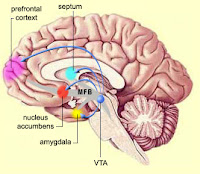Someone ever asked me, "Why is doing good things or being
kind so addictive to some people?" Apart from dogmatic rules taught by
religion, many people being kind not only because of those dogmatic commands
written in the holy book. How is the brain's mechanism related to these
addictive good things?
One of the answers to this question is because of the existence of
dopamine in brain. Dopamine is a kind of chemical substances that can stimulate
good feeling when we do good deed. Dopamine can also be found in animal’s
brain. Dopamine in animal brain has a role in such behaviors that trying to
maximize the expected outcome. I will not give further explanation about
dopamine because I will answer the main question above from gene and brain
circuit perspectives. However, you can read further explanation about dopamine
on http://en.wikipedia.org/wiki/Dopamine#Functions_in_the_brain.
According to gene perspective, we will talk about evolution.
Evolution occurs because of its mechanism. One of the mechanisms is natural
selection. Natural selections occur based on "survival of the
fittest" principle. One of behavior that has successfully survived over
the natural selection is altruistic behavior. Research shows that in a group of social species, altruist behavior
is needed in order to survive and to attract partner for reproduction.
Therefore, to human as a species (Homo sapiens sapiens) that has been survived
over thousand of natural and social selections, altruist behavior is already
planted in our gene, even it has been a competitive advantage compared to
others.
Besides of gene, doing good things or being kind or altruistic behavior
is also related to brain circuit. Human brain has 2 circuits related to this
matter. "Reward circuit" (Nucleus accumbens / NAcc) and "Altruist circuit" (Obito frontal
cortex).
Based on "reward circuit", someone acts and behave based
on reward and punishment principle. He will do good things knowing that he will
get a reward in return, such as religion concept for reward for moral conduct,
compliment, money, etc. Based on "altruist circuit", someone acts and
behave based on his virtue. He will do good things because he knows that the
deed must be done.
The development of each circuit is different for each individual,
even different for each species. In decision making process, these two circuit
work antagonistically. Does one do good things only for the rewards? Or does
one do good things because he understands that he need/must do it? Does he just
sit back knowing that he will get nothing in return? Does he avoid something
bad only because his fear over the punishment? Or does he avoid it because he
really knows that it has bad consequences for others?
Furthermore, the confrontation of those 2 circuits makes the
motive of every human act as a spectrum. Motive to seek for reward and the
sincerity of one have a ratio in every human act. Beside the illustration in
previous paragraph, someone may do good things or being kind 80% because
expecting reward, 20% because of his virtue. Someone may avoid doing bad thing
because he understand its social consequences and because of little fear of the
punishment. So, how about you?

No comments:
Post a Comment